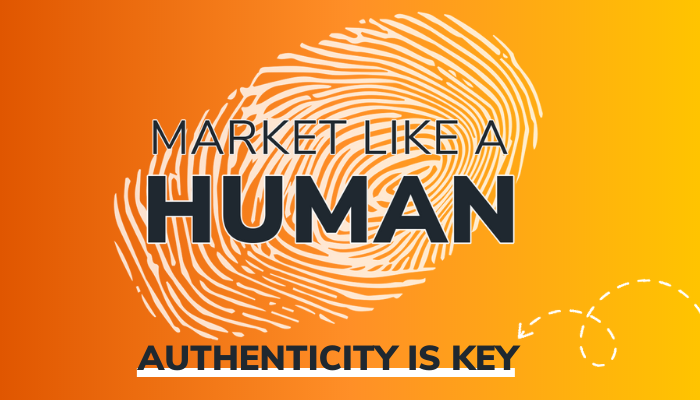We live in a world where those that aren’t authentic are being left behind or “canceled.” Consumers today can smell an inauthentic brand a mile away — the last thing you want to be compared to is a used car salesman that is only trying to force you into buying something and doesn't actually care about your needs. But being authentic today means a whole lot more than just not pushing a hard sell on someone. It means following through on your promises every single time, being who you are and not pretending to be something that you’re not, being involved in social causes that matter to your organization, and even being willing to fail and make mistakes.
Consumers understand that we aren’t perfect. And businesses that are willing to try and fail are actually applauded for being authentic and willing to make mistakes. It makes your organization relatable and human. As you think about what it means to be authentic, it's important to be your own unique, authentic brand and not try to conform to what you think your audience or society wants you to be.
So how do you go about projecting an authentic brand to your audience? Well — it doesn't happen overnight. It takes effort — not like a one-time big push effort — a consistent, every single day for years and years kind of effort in order to create a truly authentic brand that consumers relate to.
Sure, if you're looking for a quick answer or a quick trick to become a more authentic brand — that probably wasn't the answer you were hoping for. But the process of being an authentic brand can start today and can become part of how you talk about your brand, engage with your prospects, leads, and customers, and be incorporated into every piece of your marketing collateral moving forward.
Ready? Let's dive in.
Follow through on your promises
One thing that should be a non-negotiable with your brand and how you engage with your prospects, leads, and customers is your follow through.
You cannot be an authentic brand if you don't follow through on your promises.
Through our marketing campaigns, messaging, engagement with prospects, and even with the way that we present our brands, we all make promises. Whether they are explicitly outlined and stated, or they're assumed by our audience, we are making promises. And how you follow through on those promises has a dramatic impact on how your brand will be perceived by your audience.
So while HIVE may not explicitly guarantee specific results (because there are just far too many variables to say, "we guarantee your marketing campaigns with HIVE will result in $X million dollars in new revenue"), but our audience assumes that as a successful and reputable marketing agency, we are going to follow through on the deliverables and strategy needed to reach those revenue goals. Our promise, while not explicitly stated in our marketing campaigns or collateral, is to succeed for our clients and grow their businesses.
So whether you are making flat out promises and guarantees or not, you are making commitments to your audience that you need to be aware of. Your consumers are very aware of them, and they are watching to see how you follow through.
Don't be the sleazy used car salesman that promises the world and then lets your customers drive off in a lemon.
Be who you are
We all want to be liked and remembered, but far too often, businesses try to be someone their not because they think that is who their audience wants them to be. Trying to fit a perceived mold or model of what you think the world wants is a sure way to fail. The businesses that are truly perceived as authentic are the ones that own who they are, faults and all.
That means that whatever the personality of your business is, you own it. You embrace it. You love it. You don't have to be the cool brand that everyone wants to emulate. You don't have to be the funny brand that people follow for a laugh. And you don't have to be the stuffy brand that you think everyone in your industry expects you to be.
If you're funny — be funny.
If you're clever — be clever.
If you're straight-edge — be straight-edge.
If you're focused on activism — share your passions and the causes closest to your heart.
If you're pushing an agenda — push it (but don't try to cover it up).
The point is, you don't have to fit a mold.
You don't have to fit a mold.
You don't have to play a part — regardless of what industry or business you're in. You can be authentically you. Law firms don't have to be uptight and rigid. Medical clinics can have a sense of humor. And your real estate company can drop a tasteful f-bomb here and there (if it's who you are).
Be you, and your audience will follow.
Social responsibility
We are living in a world that very much values social responsibility, and the brands that take up a cause, support it, and share that cause with their audience are winning and will continue to win. Again — we are talking about authenticity here, so I am absolutely not saying that you should take up a social cause in order to sell more widgets. I am, however, saying that, as organizations, we all have a responsibility to make the world a better place. We have resources. We have an audience. And we have a stage. We need to use that stage to champion things we care about in order to improve our world.
In fact, 45% of businesses are focused on increasing their social responsibility over the next year. Consumers are gravitating toward businesses that care about more than just a sale. They gravitate towards the businesses that stand for something. The businesses that believe in something. The businesses that care.
Of course, this is not your marketing campaign alone, but it does support an authentic business image that is part of the community (even if it is a global community). More about community in a later chapter.
Now, your cause can be anything. A great place to start can be to take an interest in the passions of your team, clients, and families. For HIVE, we have championed several causes over the years, from feeding children at underprivileged schools in the Denver metro area to school supply drives to startup business events to pushing the careers of women forward. These are all things that our team cares deeply about, so as an organization, we helped support those causes.  The HIVE team dropping off school supplies from our school supply drive
The HIVE team dropping off school supplies from our school supply drive
 Supporting the Food For Thought food drive to deliver meals to local schools
Supporting the Food For Thought food drive to deliver meals to local schools
HIVE supporting Denver Startup Week
Businesses today cannot just be about revenue and profit. If you're going to grow, build a loyal audience, and continue to have an impact with your marketing and sales initiatives — you have to care about more than dollars. You have to care about something deeper than that.
Find your organization's passions and calling outside of making a new sale and invest in it.
Go live
Going live had a huge surge when the option first came out on the different social platforms. Everyone wanted to go live for anything and everything. It was honestly a little bit of chaos. I remember getting notifications that so-and-so was going live, only to join the live session to see the top of their forehead while they tried to figure out how to go live. It was a weird time.
Fast forward several years, and going live has actually died off considerably. People and businesses have become nervous and afraid to go live because it opens up an element of imperfection. There is an opportunity to mess up. You might stumble over your words or mispronounce something, or — gasp — you might lose your train of thought for a second.
Now, I don't mean to downplay this or mock those insecurities. These are legitimate fears. There is a reason that public speaking is the number one fear in the world. It's intimidating. It can be downright scary.
But as an organization, if you want to grow your audience, if you want to grow your brand recognition, and if you want to ultimately grow your business, you have to be willing to fail. You have to be willing to be human. You have to be ok with the fact that you're not always going to be perfect.
Here's the kicker — people actually respect it. People empathize with the imperfect. There is literally not a movie out there where the protagonist is perfect. They all have imperfections, and that is what makes them relatable, and that is what makes us care about those characters. Messing up or having a bad day is part of the human experience. Businesses that pretend to always be perfect, only say the exact right thing, and only do the expected aren't memorable. They're not relatable. They're not authentic because we all know that even if they project only a perfect picture, we know that behind the scenes, they're not.
So going live doesn't have to be the medium you choose (though it can be very impactful right now because there is far less competition and social networks want you to use that tool), but the point of all of this is to say that taking a chance and being willing to fail (and even fail publicly) will build a lot of trust with your audience. It will show your human side. We can all relate to a misstep here and there. Life isn't scripted. Take the chance — no outcome is worse than doing nothing.
Authenticity is one of the core pillars of my upcoming book, Market Like A Human. If you found this interesting, click the link below to sign up for information on pre-orders, giveaways, and launch dates.
Read more about the pillars of Market Like A Human:
Market Like A Human: Consistency Wins



.png?width=100&height=100&name=HubSpot%20for%20K%E2%80%9312%20Education%20How%20Schools%20Use%20HubSpot%20to%20Improve%20Enrollment%20(and%20How%20to%20Set%20It%20Up).png)
.png?width=100&height=100&name=The%20Complete%20Guide%20to%20HubSpots%20Prospecting%20Agent%20(2025%20Edition).png)
